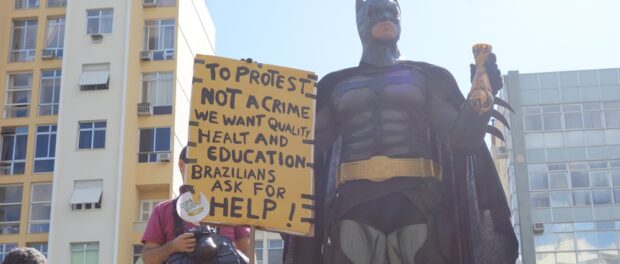
Two days after a nationwide police operation preemptively arrested several protesters in Rio, São Paulo, and Porto Alegre on trumped-up charges, approximately 500 people gathered for the morning march on the final day of the World Cup to ask “Copa Para Quem?” (World Cup for Whom?) Starting in Praça Afonso Pena, they headed to Praça Saens Pena in Rio’s Tijuca neighborhood on Sunday morning before the tournament concludes this afternoon at Maracanã. They were flanked in the rear and on one side by phalanxes of military police, some dressed in the much-loathed “Robocop” gear, with groups of police stationed on every side of Praça Saens Pena. I joined the morning portion of the protest about halfway through until it reached its destination, and, different from the larger afternoon protest covered on RioOnWatch’s Twitter feed at #RioCupWatch, there were no indications of violence on the part of either police or protesters. The two walked side-by-side during the morning protest, oftentimes just feet from each other, and indeed the police occasionally looked bored–some were checking their cell phones or otherwise ambling along at the leisurely pace set by the marchers.
The protesters, for their part, represented a diverse group of causes, both related and unrelated to the event looming this afternoon. On the World Cup side, they included accusations against the economic and social cost of the event, the forced eviction of low-income and favela residents, the corrupt relationship between FIFA and politicians, police violence and repression of the right to protest, the privatization of public goods and services, and a lack of healthcare and education at the expense of the event. Other groups included left political parties. In light of ongoing events in the Middle East, there were also several Palestinian flags.
T-shirts, costumes, and uniforms covered a wide gamut, from the aforementioned political parties to holdovers from last year’s teachers’ strike to “Fifa Terrorista” to Batman clutching a sign and mock World Cup trophy. There were scattered Germany and Argentina jerseys in the crowd – one woman wore a Messi jersey with a keffiyah over her head – and a notable absence of CBF jerseys, albeit plenty of Brazilian colors. A pair from the Carnavandalirização movement included a Choque de Amor t-shirt and a woman in a pink boa with glitter on her cheeks. The latter, named Renata, said she was acquainted with Sininho, one of the nearly 20 people arrested on charges of forming an armed gang. According to various online social media sources familiar with the situation, a legally registered gun belonging to a relative of one of the arrested individuals has formed the basis of this serious, but likely spurious, allegation. Renata said that the tense situation, including the arrests, had caused a lot of people to stay home out of fear.
At its core, an animated drum corps, saxophone, clarinet, and flute led the group in chants that have become common refrains in Rio during the protests:
“Não acabou / Tem que acabar / Quero fim à polícia militar (It’s not over yet / It has to end / I want the end of the military police)”
“Da Copa, da Copa, eu abro mão / Quero meu dinheiro pra saúde e educação (The Cup, the Cup, I’ll gladly give up / I want my money to go to health and education)”
“Pezão é ditador (Pezão [the governor] is a dictator”)
Shifting from samba to the rhythms of funk, Rio’s popular culture music genre par excellence, the band belted out classics like MC Galo’s “Rocinha Pede Paz” with a new refrain: “Quero saber onde Amarlido está (I want to know where Amarildo is).” They also played the socially conscious classic “Rap da Felicidade” sounding like a much smaller version of the immensely popular Monobloco band that plays annually during Carnival.
Upon arrival at Saens Pena, protesters were greeted with an open-air photojournalism display called Warld, with some of the best images to come out of the World Cup that have shown the other side of the event – the homeless sleeping at the door of the subway below signs pointing to Maracanã, favela homes marked for demolition, police violence during protests, a naked soccer game on Copacabana Beach during a Brazil match, street vendors and trash pickers pausing to watch a game on a jury-rigged TV. The photos were mounted on the side of a structure related to the Metrô, and Batman stood proudly atop it with his sign and trophy, conducting interviews. The police continued to mingle freely among the crowd and there were few signs of tension by the time I left at 1 pm. Another march was scheduled to depart from the same square shortly thereafter. I asked a woman who appeared to be organizing the next round of activity if they were heading toward Maracanã. With Rio mounting what the local press has called the biggest security operation in the city’s history, she responded “no” as if the question had long been a foregone conclusion.
